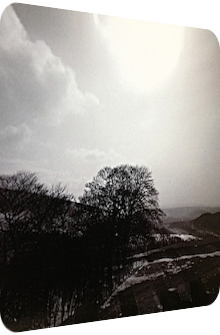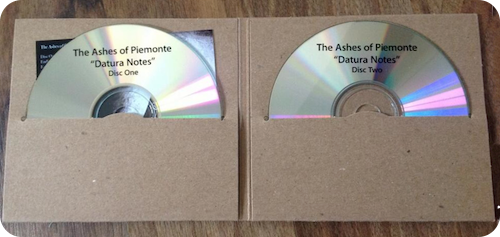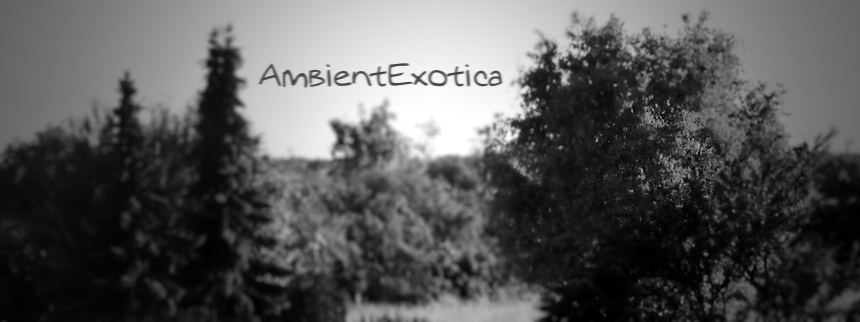
The Ashes Of Piemonte
Datura Notes
2013
The Ashes Of Piemonte is an ongoing collaboration between the Liverpool resident and synth specialist Wil Bolton and UK-born but currently Mediterranean-oriented galantuomo italiano Lee Anthony Norris who is also known by the monikers of Metamatics, Norken, Nacht Plank and other illustrious names. The duo’s second album Datura Notes is released on Gavin Catling’s Perth-based Twice Removed Records in October 2013, comprises of four long-form Ambient pieces gyrating around acoustic guitar placentas and synth channels… and comes in the shape of two CD’s, available to order at Bandcamp and fully streamable! Sure, we all have two-CD albums in our collection, no big deal, but when was the last time that a modern Ambient album has been delivered this way by an indie label? Record labels are usually lamenting about such projects: they are too expensive and niche, the artist should shorten the tracks to make them fit on one CD – yackety-yack – so big props to Gavin from Twice Removed to make it happen. The album comes in a hand-numbered kraft sleeve and features two tunes per disc. It comes down to this: Datura Notes is a blast! It merges the Tartarean myths of renowned Horror and Science Fiction author H. P. Lovecraft with a pastoral-ecclesiastic solemnity which, on the one hand, makes the album feel grave, shrouded in mystery and oddly forsaken, but also blazingly euphonious and embracing on the other. The duo is also able to transform the sceneries from stupendously cinematic angles into music. The album title is particularly helpful for any prerogative of interpretation. Datura is the scientific name for the flower commonly known as moonflower or angel’s trumpet. But wait, it gets even more portentous: the plants are toxic and, in the right dose, function as a hallucinogen. Triple the dose, and death unfolds. This paroxysmal heaviness is found throughout Datura Notes. The titular notes, meanwhile, are not linked to sheets of paper, but refer to the scent of the plant. Ambient music creates pictures before the inner eye. It can also vaporize odours and perfumes. Datura Notes is the proof of concept, and I highly advise every Ambient fan who is even distantly interested in positively somnolent Drone structures to seek out this album. I could leave it at that, right? No way, here is a meticulous look at all four tracks, and I really hope I do the black magic of both producers justice.

Inside Datura Notes. Photographed by Twice Removed Records' own Gavin Catling.
Endless Sleep In The Garden Of Dreams, qua its function as an opener, sets the tone of the whole album, one might imagine. I am not so sure about that, but embrace every one of its moments that are awash with light. Sun-dappled church-like organs of benignancy and amicability slowly fade in and greet the dazzled listener, echoey-spectral vestiges of conversations conflate with the saturated verdure of the drones. Their echoes do only partially invoke the thoughts of lost souls, for the cordial rays of light are simply too welcoming, the whole piece glows. Grafted onto the organ are vitreous shards, softly blurred Geiger counter-like fizzles and clicks, again eminently harmless and playful, as well as an – I presume – synthetic horn texture which emits multitudes of long-forgotten springs. Field recordings of floating water round off the most warmhearted of all Ambient tunes. With a runtime of 31+ minutes, one is usually keen on neglecting a sort of progression, but change does indeed unfold, albeit slowly and gradually. Take Wil Bolton’s injected acoustic guitar aorta, for instance, which adds a bucolic rurality to the scenery after approximately 12 minutes, all the while the organ textures are amplified at the same time. Coruscating cyber birds chirp in unison as the guitar textures seem to absorb moisture by the girdling helix of vibraphone chimes. On top of all this, the bass drones are carefully amplified as the piece moves forward, thereby adding a jovial profundity to the panorama. Ambient music cannot get that much more majestic than this. An elysium even in its emaciated final state where the spacial scintillae increase in adjacency to the gentle runlets, ocean waves and increasingly crepuscular aura.
From The Garden Of Dreams To The Shores Of Cthulhu is, as the old adage goes, “pretty much self-explanatory,” one does not need to be a genius to presume that The Ashes Of Piemonte augment the formerly erbaceous coppice and its rich alluvial soils with galactic globs and eerier contrapuntal ingredients. The Cthulhu marker is simply too bold a statement. Indeed, the aurally depicted shores are much murkier and hued in rufescent twilight, but Bolton and Norris do not succumb to histrionic "camera works" but slowly, if also adamantly, push themselves forward to an acroamatic antrum. The titular Shores Of Cthulhu were already implied at the end of the opener, and indeed, the gentle ocean waves are the base frame of the whole composition of 34+ minutes. The organic character of the field recording is enmeshed with crystalline screeches and prolonged-elasticized electric piano tones whose droning frostiness emanate the wide emptiness of space, the calm before the storm. The softly piercing prongs, the simulated rattling of snakes, the sanguine evening strings of the acoustic guitar and the occasional tape hiss-like haze create the oxymoronic simultaneity of diffuse clarity. This is neither an uneasy dream, nor a pleasant nightmare. It demonstrates an interim stage, one whose interstitial structures tend increasingly towards the unknown, the arcane pith of nullity. Not even a third into the long-form track, and things seem to crawl and scrape, there is an ongoing falsetto of gelid vesicles, reverberated rock slips fall into the ocean, New Age-oid synth flumes flow in the distance, and an implied bassline or rhythm in the form of a spheroidal mid-frequency gong is placed in the arrangement. The rising swell of the synth movements interpolates the enigmatic importance of the setting. It is indeed a setting or a momentary glimpse at it, and no trip per se, for everything seems stable and constant. And in terms of Cthulhu, the Old Ones can patiently wait a long time as they float through the ether. From The Garden Of Dreams To The Shores Of Cthulhu transforms this patience into music… and goes beyond.
The Colour Of Space takes the Lovecraft sub-theme further and opens the second, much shadier disc. The Cthulhu myths are undoubtedly the author’s most famous short stories, but I regard The Colour Of Space, written in 1927, as another masterpiece. The formless-polymorphous, invisible-invincible alien creature from space is thankfully amiss in Wil Bolton’s and Lee Norris’ helical dreamscape which is wonderfully cloudy and soothing at the same time. Launching with a cavernous cavalcade of droplets and a high plasticity overall, it is the translucent synth-fueled fog banks in tandem with the downwards spiraling atavistic guitar melodies that make up the lucent majority of the languorous aura. Everything feels aeriform yet earthbound; aerose jingle-worthy synth glitters and prolonged guitar sinews ennoble the density further. The omnipresence of the dripstone cave-evoking droplets is remarkably effective and luring as it lessens the potential gravity of the layers. About halfway through the track, harpsichord-resembling lute-like twangs traverse by, adding a Gothic atmosphere to a moiré that is less clichéd or chintzy than it might seem in textual form. It eventually fades away and makes room for the wraithlike synth drones to shine. The depth of the construction also results from the masked bass drones which are not melodramatically interwoven, but placed in close proximity to the nebulae and hazy veils. The Ashes Of Piemonte oscillate between a forlorn enchanted place and a jejune rusticity due to the transparent and designedly comprehensible guitar melodies. Celestial and rhizomatic at the same time, The Colour Of Space does not resolve its dichotomy, but embraces and celebrates every minute of it before the deepest, definitely jinxed and final track occurs.
The Sunken Land is the point of culmination, not just of the album itself but in regard to the stylistic density as well. Enormously phantasmagoric and strikingly unreal, the last track of The Ashes Of Piemonte inherits the most streamlined and stringent physiognomy. What sounds negative and all too sterile on paper (or rather the pixels of your reading device) turns out to be a particularly strong long-form vignette of almost 20 minutes. Two contrastive particularities become enmeshed: an easy to grasp two-note loop motif – a clever mixture of guitars and synths and whatnot – loses all traces of its shallowness due to the astonishingly ecclesiastic surfaces. The afterglow of the ghostly, faintly Balearic monk-like tone sequences is aqueous and heavy, feels portentous and pompous. Whispering fragments and chattering figments create a susurrant chaparral of lost souls. Ruins of hideouts, buildings and even whole cathedrals are evoked due to the solemn-somnolent atmosphere. Is this song about Mu? Is Lovecraft's R'lyeh resurrected? Whatever the location, The Sunken Land showcases the magic of the perfect loop, for even though there are standstill and nonentity all over this piece, it is the voluminous loneliness and crestfallen destruction of a once prospering civilization that is skillfully captured and encapsulated in the aural vaults and cavities. This is a catchy masterpiece which captured my heart the minute it was uploaded to SoundCloud; a better advertisement is hardly conceivable. The Sunken Land does not necessarily outshine the remaining triad of tracks, but is mercilessly tailored to my taste. The word “masterpiece” is used all too often, and shamelessly so, but this very composition comes close and functions as the revelatory path leading back to the album title: the drugged state invoked by the scents – or stench – of the titular Datura Notes is most-audible here. Thickly wadded in thermal heat, sepia-tinged layers of remembrance and past centuries, The Sunken Land closes the album in the most poignant way.
Datura Notes is one of the rare “form follows function” works. The pieces are monstrously long because Gavin Catling keeps the faith and arranges the necessary things to make this album become reality. New double albums become increasingly rare, and it is a coup de main that Twice Removed Records is able to both allow and realize such a project. I wouldn’t want to miss a second of the erudite Ambient fluxions Wil Bolton and Lee Norris come up with. Every composition is carefully crafted and varied enough – both intrinsically within a track's own boundaries and in contrast to the surrounding foils – to not let this album appear aurally verbose or contingent. There are Drone albums that meander along and comprise of a collection of dourly determined textures which offer their own set of advantages; oddly enough, H.P. Lovecraft superfan Joseph Curwen (!) comes to mind whose similarly long but much more baleful and ominously terrifying releases such as Herbert West and Strange Olden Ruin (both 2013) capture one mood and then freeze this particular frame. The Ashes Of Piemonte only do this on the superb closer The Sunken Land where the Moebius Loop would surely be approved by Lovecraft. All other tracks are much more progressive, bustling with field recordings, purposely simplified and translucent guitar melodies as well as synth nebulae from heterodyned dimensions. It has to be said in precise clarity: Datura Notes is no ode to Lovecraft! It plays with the listener’s expectations, offers him or her opalescent triggers such as the infamous Cthulhu myth, but stands entirely on its own feet. Rarely have I encountered such long pieces of 30+ minutes that are this electrifying, with a plasticity to submerge into, a void or maelstrom to be torn apart by. The Ashes Of Piemonte are masters of twilight luminosity, and yet their motives are noble: the opener Endless Sleep In The Garden Of Dreams is paradisiac and joyously bright without ever crossing the territory of chintzy lands. From The Garden Of Dreams To The Shores Of Cthulhu is a tad more icy but warmed via ocean waves and pristine guitar chords. The Colour Of Space literally drops the very best aqueous field recording next to circumambient synth strata, and The Sunken Land glorifies submerged ruins where time stands stiller than still. Datura Notes is already a classic for me, one which has already been played numerous times during desk-related tasks and moments of contemplation. Diffusion is all over it, but the drug-assisted myopia opens the eyes… and isn’t hazardous to any listener’s health. A megalomaniac project of gargantuan proportions. Super-recommended, I kid you not!
Further listening:
- You can purchase and listen to Datura Notes in full at Bandcamp.
- Follow Lee Norris and Twice Removed on Twitter: @metamatics & @twiceremovedrec.
Ambient Review 268: The Ashes Of Piemonte – Datura Notes (2013). Originally published on Oct. 2, 2013 at AmbientExotica.com.
